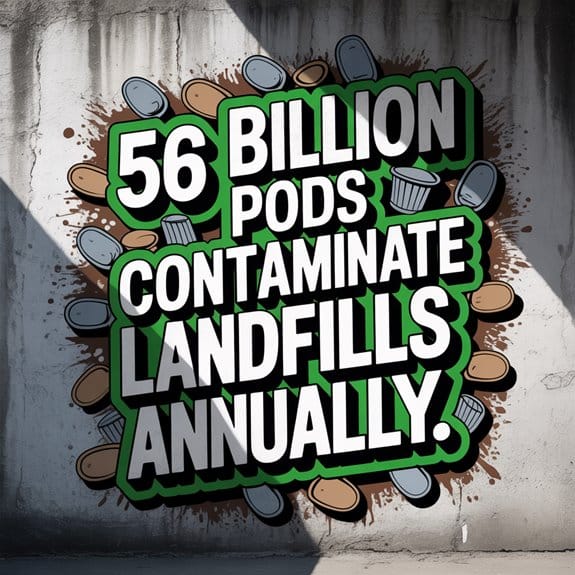As coffee pods offer brewing convenience, research suggests they pose hidden health and environmental risks. Recent studies found K-Cups and similar single-use pods release microplastics and chemicals into coffee during brewing. When heated, plastic materials can break down, letting tiny plastic particles and compounds like BPF leach into drinks. Though these chemicals often fall below safety limits, experts warn long-term exposure could harm health. Recent user reports describe “Keurig sickness” symptoms like headaches and nausea, allegedly caused by mold growth in poorly cleaned machine reservoirs. The problem isn’t limited to coffee cups: discarded pods also release contaminants as they slowly decompose in landfills.
Research reveals coffee pods leak microplastics and BPF when heated and contaminate landfills, posing long-term health risks despite current safety thresholds.
Additionally, some coffee storage solutions, like the Airscape Coffee Canister, can help maintain freshness and avoid some contaminants introduced during brewing. Over nine billion used K-Cups ended up in landfills in 2014 alone, creating a lasting waste problem. Current estimates indicate over 56 billion coffee pods now contribute to landfill waste annually, with non-compostable variants persisting for centuries. Their mixed plastic, aluminum, and ink layers make recycling complicated, even as companies push new “eco-friendly” options. Cities like Hamburg, Germany, banned single-use pods in government buildings to curb environmental damage. Similar debates now drive policy discussions worldwide, with calls for stricter rules on manufacturing and disposal.
Major retailers have begun pulling certain pods from shelves amid rising consumer anxiety. Reports of soil and water pollution linked to decomposing pods intensified scrutiny. Brands now face pressure to adopt compostable materials or switch to reusable designs. Some companies introduced 100% plant-based pods, while others improved recycling programs.
However, shifting to sustainable options raises costs, complicating efforts to balance affordability with environmental goals. Public awareness campaigns highlight alternatives like French presses or pour-over methods, which avoid plastic waste. Younger shoppers increasingly favor brands promoting eco-friendly practices, reshaping market trends. Meanwhile, labs investigate innovations like biodegradable coatings and advanced recycling tech to tackle the pod pollution crisis.
Though the $15 billion global coffee pod market thrives, local bans on non-recyclable pods threaten businesses reliant on single-use sales. Retailers removing these products face short-term revenue risks but aim to align with shifting consumer values.
Governments and companies now grapple with a question: Can convenience coexist with sustainability, or must one give way? For now, the answer remains as murky as a cup of coffee brewed through plastic.



